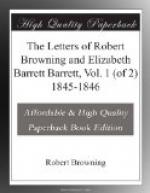But about this soon—for night is drawing on and I go out, yet cannot, quiet at conscience, till I report (to myself, for I never said it to you, I think) that your poetry must be, cannot but be, infinitely more to me than mine to you—for you do what I always wanted, hoped to do, and only seem now likely to do for the first time. You speak out, you,—I only make men and women speak—give you truth broken into prismatic hues, and fear the pure white light, even if it is in me, but I am going to try; so it will be no small comfort to have your company just now, seeing that when you have your men and women aforesaid, you are busied with them, whereas it seems bleak, melancholy work, this talking to the wind (for I have begun)—yet I don’t think I shall let you hear, after all, the savage things about Popes and imaginative religions that I must say.
See how I go on and on to you, I who, whenever now and then pulled, by the head and hair, into letter-writing, get sorrowfully on for a line or two, as the cognate creature urged on by stick and string, and then come down ‘flop’ upon the sweet haven of page one, line last, as serene as the sleep of the virtuous! You will never more, I hope, talk of ‘the honour of my acquaintance,’ but I will joyfully wait for the delight of your friendship, and the spring, and my Chapel-sight after all!
Ever yours most faithfully,
R. BROWNING.
For Mr. Kenyon—I have a convenient theory about him, and his otherwise quite unaccountable kindness to me; but ’tis quite night now, and they call me.
E.B.B. to R.B.
50 Wimpole Street: Jan. 15, 1845.
Dear Mr. Browning,—The fault was clearly with me and not with you.
When I had an Italian master, years ago, he told me that there was an unpronounceable English word which absolutely expressed me, and which he would say in his own tongue, as he could not in mine—’testa lunga.’ Of course, the signor meant headlong!—and now I have had enough to tame me, and might be expected to stand still in my stall. But you see I do not. Headlong I was at first, and headlong I continue—precipitously rushing forward through all manner of nettles and briars instead of keeping the path; guessing at the meaning of unknown words instead of looking into the dictionary—tearing open letters, and never untying a string,—and expecting everything to be done in a minute, and the thunder to be as quick as the lightning. And so, at your half word I flew at the whole one, with all its possible consequences, and wrote what you read. Our common friend, as I think he is, Mr. Horne, is often forced to entreat me into patience and coolness of purpose, though his only intercourse with me has been by letter. And, by the way, you will be sorry to hear that during his stay in Germany he has been ‘headlong’ (out of a metaphor) twice; once, in falling from the Drachenfels, when he only just saved himself by catching at a vine; and once quite lately, at Christmas, in a fall on the ice of the Elbe in skating, when he dislocated his left shoulder in a very painful manner. He is doing quite well, I believe, but it was sad to have such a shadow from the German Christmas tree, and he a stranger.




